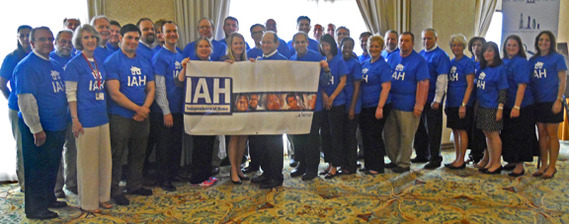
Representatives from IAH sites across the nation gathered together May 2<sup>nd</sup> in Grapevine, Texas, including Housecall Executive Director Terri Hobbs (second from left)<strong> and Transition Nurse Mary Sayre.</strong>
If there was ever any doubt that Oregon was leading the nation when it comes to elder and end-of-life care, the buzz coming from the recent American Academy of Home Care Physicians (AAHCP) annual meeting in Grapevine, TX, should have drowned it out.
Housecall Providers Executive Director, Terri Hobbs, and transition nurse, Mary Sayre, RN, were in attendance along with representatives from home based primary care practices across the nation. Although they did not give a formal presentation, they were sought out for information about the best practices we use every day to treat people successfully where they live.
The first day of the event offered members of the 16 sites and three consortium involved in the Independence at Home (IAH) National Demonstration Project an opportunity to come together to share best practices and discuss strategies for delivering better patient-centered care.
Terri and Mary were asked to describe how we utilize a team of social workers, care coordinators and a transition nurse to triage urgent conditions and also help dramatically reduce 30-day hospital readmissions. This led to a discussion among participants about using and implementing a “team” approach instead of standard primary practices. Terri and Mary emphasized the importance of the transition nurse in keeping patients from having unnecessary ER and hospital visits.
During the conference, the Oregon medical community was heralded for creating the Physician Order for Life Sustaining Treatment (POLST) form. This is something that we at Housecall Providers take very seriously.
The POLST document is an approach to end-of-life planning based on conversations between patients, loved ones, and medical providers. End-of-life wishes are stated and written down so that caregivers know what a patient's intentions are.
The document, created in Oregon in the 1990s, is designed to ensure that seriously ill patients can choose the treatments they want and that their wishes are honored by medical providers. It is usually kept in clear sight so emergency responders are able to access the information quickly. The POLST document has gained acceptance across the nation and currently all but eight states are either in a mature, endorsed or developing stage of a POLST program.
Oregon was also recognized at the conference for establishing the adult foster home (AFH) movement in the 1980’s. These homes, for individuals who require some level of health care and possibly assistance with tasks of daily living, are licensed and inspected and usually have from one to five residents in addition to the homeowner. Housecall Providers has many AFH patients. With much of the nation still using the traditional nursing home and assisted living facilities, Oregon is ahead of the curve in keeping its residents in the community longer.
Next year’s conference will be held in Orlando, Florida and we are eager to see the gains that our peers across the nation will have made in patient-centered care.